The 2021 Yale Philanthropy Conference (YPC), focused on “Reimagining Philanthropy,” brought together over 60 experts (donors, practitioners, fundraisers, scholars, and advisors) across two days to discuss the past and future of grantmaking and investment.
The team at Submittable is always looking to better understand what foundations, nonprofits, and corporations using our grant management platform and CSR solution need (and what they care most about)—and a few of us were honored to attend YPC 2021. While we couldn’t make every session, we’re pleased to share key learning from several informative and inspiring conversations.
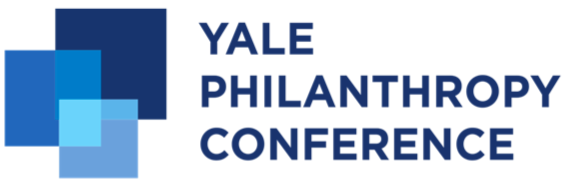
Big thanks to everyone who made this incredible event possible, especially the student organizers—YPC is student-run, planned by MBA/EMBA students at the Yale School of Management and MA Candidates at the Yale Jackson Institute of Global Affairs.
To live your values at work, you may need to be the one in charge
Judy Belk in Conversation with Daniel Lee
Judy Belk (she/her/hers), President and CEO, The California Wellness Foundation
Daniel Lee (he/him/his), Executive Director, Levi Strauss Foundation

In this conversation, Belk, former senior vice president of Rockefeller Philanthropy Advisors and vice president of global public affairs at Levi Strauss & Co., reflected on her long career as a leader in corporate philanthropy, the ways in which moments of adversity shaped her career and her drive, and ways to tap into resilience in the face of racism.
KEY TAKEAWAY
OTHER FAVORITE IDEAS
- Another example of adversity Belk shared was making the decision—controversial at the time—to defund the Boy Scouts while at the Levi Strauss Foundation due to their discrimination against the LGBTQ community. While she knew in her bones it was the only right thing to do, consistent with the Foundation’s own anti-discrimination policy, at the time, she thought she might be fired.
- Now, Belk is spending more time than ever before in her career writing. Informed by her work with Hedgebrook, a women’s writing retreat in Washington state that magnifies women’s voices and pushes for social change, she reflected that writing is a key way that she works through experiences of racism.

There is no single, foolproof approach to impact data
Data Drive-Impact: Innovations in Evidence-based Philanthropy
- Ruth Levine (she/her/hers): CEO, IDinsight
- Rakesh Rajani (he/him/his): Vice President, Programs, Co-Impact
- Asif Saleh (he/him/his): Executive Director, BRAC
- Neil Buddy Shah (he/him/his): Managing Director, GiveWell
Ahmed Mushfiq Mobarak (he/him/his)
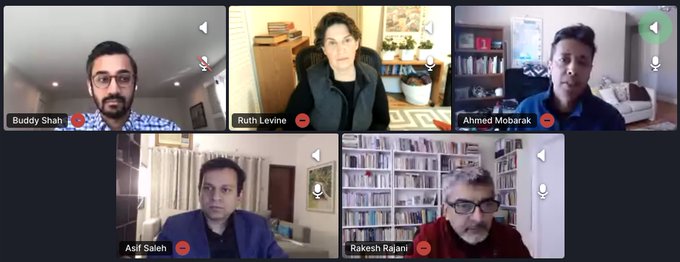
In this panel, focused mainly on global philanthropy, experts discussed data collection and analysis among donors, researchers, and implementing organizations (including nonprofits and foundations). They drew out the complications and power dynamics in these relationships, discussed the evolution of impact analysis, and offered strategy suggestions.
KEY TAKEAWAY
OTHER FAVORITE IDEAS
- For organizations seeking grants, Ruth Levine suggested two data-driven strategies for successful proposals:
- Show that you are using available evidence to guide your programs in order to prove you’re “building on the existing evidence and addressing a gap.”
- “Demonstrate in an authentic way that you’re a learning organization” so that you can find the best solutions to problems, rather than picking one approach and refusing to adjust.
To love someone, you have to know them
The Role and Responsibility of Philanthropy: Reflections on 2020
- Erik Clemons (he/him/his): President and Chief Executive Officer, ConnCAT
- Una Osili, PhD (she/her/hers): Associate Dean, IU Lilly Family School of Philanthropy
- Caren Yanis (she/her/hers): Principal, Croland Consulting/Philanthropic Advising
Kimberlee Cornett (she/her/hers): Director, Impact Investments, Robert Wood Johnson Foundation
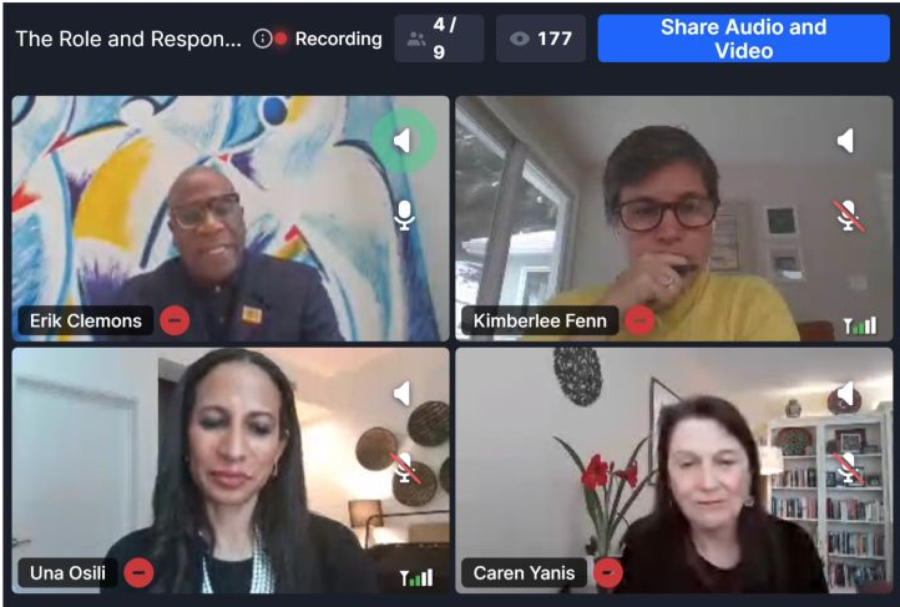
In this panel, experts shared breaking data on giving in 2020 and some of the biggest challenges—and opportunities for growth—facing the industry going forward.
KEY TAKEAWAY
OTHER FAVORITE IDEAS
- When it comes to impact reporting, it’s key to remember that under the numbers are people. Hard data must be balanced with qualitative data, i.e., stories.
- How to balance emergency needs and long term objectives? A disaster budget helps.
- “No water in my moat”: a motto for funders from Caren Yanis.
- For social justice to be achieved, there must be a healthy sharing of not only resources, but power.
Crisis requires funders to strike a new financial balance
Endowment Management: Exploring Foundations’ Response to COVID-19
- Dimple Abichandani (she/her/hers): Executive Director, General Service Foundation
- Margot Brandenburg (she/her/hers): Senior Program Officer, Ford Foundation
- Rochelle Witharana (she/her/hers): Chief Financial Officer, The California Wellness Foundation
- Tim Yates (he/him/his): President and Chief Executive Officer, Commonfund Asset Management Co.
George Suttles (he/him/his – moderator): Executive Director, Commonfund Institute
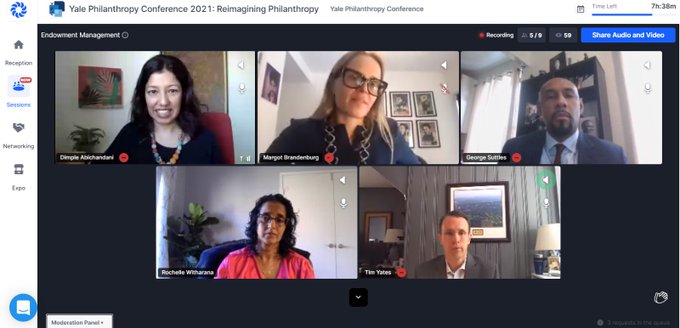
Three members of foundation leadership teams and a finance expert in this panel discussed leveraging endowments to address the COVID-19 crisis. They discussed the challenges of balancing the goal of perpetuity (and funds reserved for that purpose) with immediate need in their communities—“Why are we sitting on this money when there is so much suffering all around us?” Rochelle Witharana asked.
KEY TAKEAWAY
OTHER FAVORITE IDEAS
- Here’s the General Service Foundation’s “balancing test.”
- Rochelle Witharana urged foundation teams to question authority: “If you work for a foundation, I challenge you to ask your leadership about your perpetuity strategy. Push your leadership. That’s how you can spark the change.”
- “If you’ve worked for one foundation, you’ve worked for one foundation,” Margot Brandenburg said, noting the distinct goals and circumstances for each institution. She also urged funders to question: “How do you leverage the other 95% of the portfolio for good?”
- Funders should spend time considering what works for them. Plus, according to Tim Yates, “You also need a crisis playbook. Get as creative as you can with crisis playbooks.”
Level up your grant management process
Contact our team to see what you could accomplish with Submittable.
Philanthropy must reimagine its relationship to risk
There’s No Going Back
Pia Infante, Trustee and Co-Executive Director, The Whitman Institute
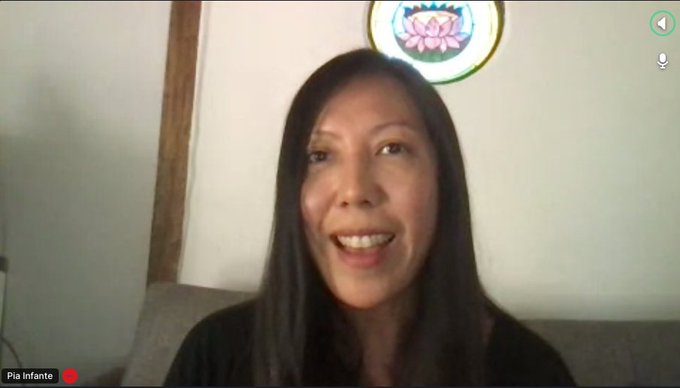
KEY TAKEAWAY
OTHER FAVORITE IDEAS
- Philanthropic work can be a grind. If we aren’t creative, we will “replicate the same systems of extraction that got us here.”
- Adopting a mindset that “there is unlimited capital”, versus a mindset of scarcity or having to choose one thing instead of another.
- How can we broaden our imagination in grantmaking? Not as a checklist, but in terms of embodying racial justice principles? This is how we can move not just money, but move culture.
- The principle behind attributed power is to share it, not hoard it. Ask yourself: how are you hoarding power and money?
Movements needs to prioritize intersectionality
LGBTQ Philanthropy: What Comes After Nondiscrimination
- Sam Brinton (they/them/theirs): Vice President of Advocacy and Government Affairs, The Trevor Project
- Michael Dabbs (he/him/his): Senior Communications Officer, Gill Foundation
- Rick Chavez Zbur (he/him/his): Executive Director, Equality California
Robin Dembroff (they/them/theirs): Assistant Professor of Philosophy, Yale University
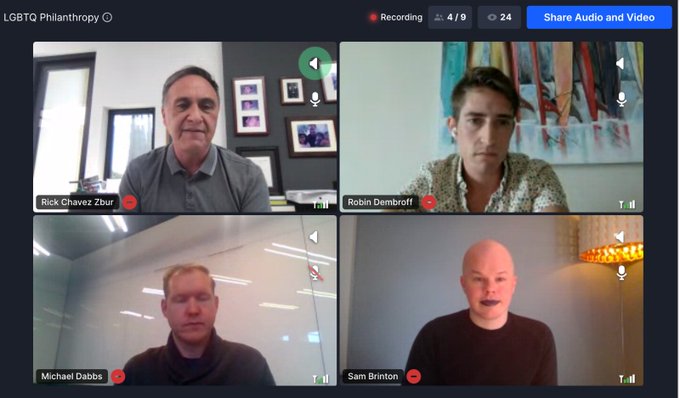
In this panel, leadership from LGBTQ+-focused funders discussed current concerns and focus areas, what they’ve learned from previous wins for the community, and strategies for continuing to drive change in spite of a conservative federal court.
KEY TAKEAWAY
OTHER FAVORITE IDEAS
- According to Rick Chavez Zbur, schools are the key to LGBTQ+ civil rights. “Our focus has to be the schools because our opponents are there but also it’s the place to really make equality happen… If we’re going to address the health and welfare disparities, we have to keep kids in school.”
- Brinton pointed out that the lack of death data for LGBTQ+ populations needs to be addressed: “When we die, you need to ask about our gender and sexual identity. The lack of identification is killing. You want to be intersectional? Capture our data!”
Reimagine your own giving process
Whether you’re looking to fund big change, build better and more trusting relationships with grantees, foster equity, or collect key data (and all of the above), Submittable is here to help.
Our grant management software and CSR solution can streamline even the most intricate application, review, and reporting process so your organization can focus on what matters most—improving our world for years to come. Reach out anytime to learn more or watch a demo. We love connecting with the people investing in real change.